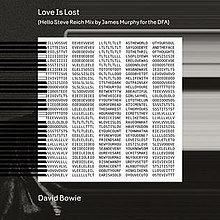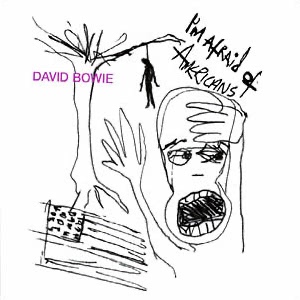
"I'm Afraid of Americans" is a song by the English musician David Bowie, released as a single from his album Earthling on 14 October 1997 through Virgin Records. The song was co-written by Bowie and Brian Eno and originally recorded during the sessions for Bowie's 1995 album Outside; this version was released on the soundtrack of Showgirls (1995). The song was then remade during the sessions for Earthling, featuring rewritten lyrics, overdubs and transposed verses. An industrial and techno track, it presents a critique of America through the eyes of a stereotypical "Johnny" and is characterised by drum patterns, synthesisers, various loops and vocal distortions.
DFA Records is an American independent record label founded in 2001 by Mo' Wax co-founder Tim Goldsworthy, musician James Murphy, and manager Jonathan Galkin. They previously had a production team called The DFA, consisting of Goldsworthy and Murphy.

"Golden Years" is a song by the English musician David Bowie, released by RCA Records on 21 November 1975 as the lead single from his tenth studio album Station to Station (1976). Partially written before Bowie began shooting for the film The Man Who Fell to Earth (1976), the song was mostly compiled in the studio and was the first track completed for the album. Co-produced by Bowie and Harry Maslin, recording took place at Cherokee Studios in Los Angeles during September 1975. Due to Bowie's heavy cocaine use, he later recalled remembering almost nothing of Station to Station's production.

James Jeremiah Murphy is an American musician, DJ, singer, songwriter, and record producer. His most well-known musical project is LCD Soundsystem, which first gained attention with its single "Losing My Edge" in 2002 before releasing its eponymous debut album in February 2005 to critical acclaim and top 20 success in the UK. LCD Soundsystem's second and third studio albums, Sound of Silver (2007) and This Is Happening (2010) respectively, were met with universal acclaim from several music review outlets. Both albums have also reached the top 50 in the Billboard 200.

"China Girl" is a song written by Iggy Pop and David Bowie in 1976, and first released by Pop on his debut solo album, The Idiot (1977). Inspired by an affair Pop had with a Vietnamese woman, the lyrics tell a story of unrequited love for the protagonist's Asian girlfriend, realizing by the end that his Western influences are corrupting her. Like the rest of The Idiot, Bowie wrote the music and Pop improvised the lyrics while standing at the microphone. The song was released as a single in May 1977 and failed to chart.

"Survive" is a song by the English musician David Bowie from his 1999 album Hours. It was later released in remixed form as the album's third single on 17 January 2000, reaching number 28 in the UK. Written by Bowie and Reeves Gabrels, it is a reflective number detailing the end of a relationship. Musically, it recalls the sound of Bowie's folk rock music of the late 1960s, and 1971's Hunky Dory. Its music video echoes the reflective quality of the recording, portraying Bowie levitating at a kitchen table with an egg. Praised as a highlight of Hours, Bowie performed "Survive" frequently through 1999 and 2000.
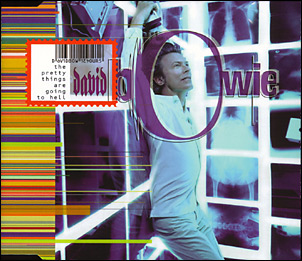
"The Pretty Things Are Going to Hell" is a song by the English musician David Bowie from his 1999 album Hours. Written by Bowie and Reeves Gabrels, its title references past songs such as "Oh! You Pretty Things" and the Stooges' Raw Power track "Your Pretty Face Is Going to Hell". On Hours, the song is a rockier number that contains elements of 1970s glam rock. The lyrics offer views on disillusionment and aging. The song was first released in a different mix in the film Stigmata before being released as the first single from the album in Australia and Japan, replacing "Thursday's Child". An unreleased music video was filmed that depicted Bowie encountering several of his past personas. It was performed live in 1999 and 2000.
"Shadow Man" is a song written by the English singer-songwriter David Bowie. It was first recorded on 15 November 1971 at Trident Studios in London during the sessions for The Rise and Fall of Ziggy Stardust and the Spiders from Mars (1972) and left unreleased. A folk ballad, the lyrics discuss topics of self-identity and doubling, and the impact one's present self has on their future lives, themes some linked to the Shadow concepts of Carl Jung.
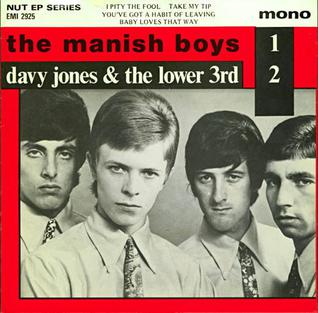
"You've Got a Habit of Leaving" is a song by the English singer-songwriter David Bowie, recorded and released as a single on 20 August 1965 through Parlophone. Released under the name Davy Jones, it featured his band at the time, the Lower Third, whose contributions were uncredited. Produced by Shel Talmy and recorded in early July 1965, the single marked a departure from the Americanised R&B of his two earlier singles into Who-style mod music. The original recording later appeared on the compilation albums Early On (1964–1966) (1991) and Nothing Has Changed (2014).
"Baby Loves That Way" is a song written by David Bowie in 1965 and released as the B-side of single "You've Got a Habit of Leaving" under the name Davy Jones with his band at the time, the Lower Third, who were uncredited. Bowie later remade the song during the sessions for his Toy album in 2000, which was officially released in 2021.
"Bring Me the Disco King" is a song written by David Bowie in the early 1990s, and recorded three times, although only the last recording was released as part of Bowie's Reality album in 2003. A remix was also released in 2003 as part of the Underworld movie soundtrack.

Clapping Music is a minimalist piece written by Steve Reich in 1972. It is written for two performers and is performed entirely by clapping.

"Ashes to Ashes" is a song by the English singer-songwriter David Bowie from his 14th studio album, Scary Monsters (1980). Co-produced by Bowie and Tony Visconti, it was recorded from February to April 1980 in New York and London and features guitar synthesiser played by Chuck Hammer. An art rock, art pop and new wave song led by a flanged piano riff, the lyrics act as a sequel to Bowie's 1969 hit "Space Oddity": the astronaut Major Tom has succumbed to drug addiction and floats isolated in space. Bowie partially based the lyrics on his own experiences with drug addiction throughout the 1970s.

The Next Day is the 25th studio album by the English musician David Bowie. Released in March 2013, it was Bowie's first studio release in ten years, as he had retreated from public view after undergoing a procedure to treat a blocked heart artery in 2004. Co-produced by Bowie and Tony Visconti, the album was recorded in New York City between May 2011 and October 2012. It featured contributions from session musicians, some of whom he had worked with in the past, including Gerry Leonard, Earl Slick, Gail Ann Dorsey, Steve Elson, Sterling Campbell and Zachary Alford. Recording took place in secret; all personnel involved signed non-disclosure agreements.
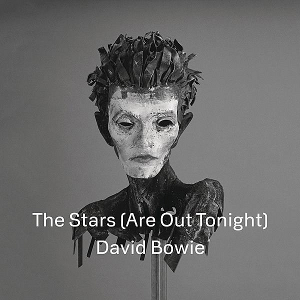
"The Stars (Are Out Tonight)" is a song by English musician David Bowie; it serves as the second single from his twenty-fourth studio album The Next Day. The song's official music video was released on 25 February 2013 and the song itself was released for digital download the following day. In the UK it joined BBC Radio 2's Playlist in the B list in March 2013, "The Next Day" was also the album of the week beginning 11 March, the week in which it was released. The song was released with "Where Are We Now?" – the album's first single – on a limited edition 7" 45 vinyl record on 20 April 2013 in celebration of Record Store Day. In December 2013 the song was nominated for a 2014 Grammy Award in the category 'Best Rock Performance'.

"The Next Day" is a single by English rock musician David Bowie, from his 25th studio album, The Next Day. The song caused controversy before the single's release due to its perceived mocking of Christianity, which some Christians considered obscene.

"Valentine's Day" is a song by English rock musician David Bowie, the fourth single from his 25th studio album The Next Day. The single was released on 19 August 2013. This was to be Bowie's final 7-inch single issued from a new album released in his lifetime. The lyrics are based on the psychology of a school shooter.

"Sue (Or in a Season of Crime)" is a song by English musician David Bowie released on 17 November 2014 as the lead single from the 2014 compilation album Nothing Has Changed. Co-produced by Bowie and longtime collaborator Tony Visconti, the song originated after the two saw bandleader and composer Maria Schneider perform with her orchestra in May 2014. They began collaborating on Bowie's first major project since The Next Day (2013). Following workshop sessions in mid-June, the track was recorded officially at Avatar Studios in New York on 24 July 2014, with contributions from Schneider's orchestra.
"Let Me Sleep Beside You" is a song written and recorded by the English singer-songwriter David Bowie. It was recorded on 1 September 1967 at Advision Studios in London and marked the beginning of Bowie's working relationship with producer Tony Visconti, which would last for the rest of Bowie's career. A departure from the pop and music hall-influenced material of Bowie's 1967 self-titled debut album and other singles for Deram Records, the song displays a more rock-oriented sound with a cello arrangement from Visconti. The impressionist lyrics also depart from Bowie's prior works, describing love using the act of sleeping together rather than through emotional attachment. The song was rejected by Deram for release as a single, purportedly due to the risqué title. It remained unreleased until 1970's The World of David Bowie compilation.
